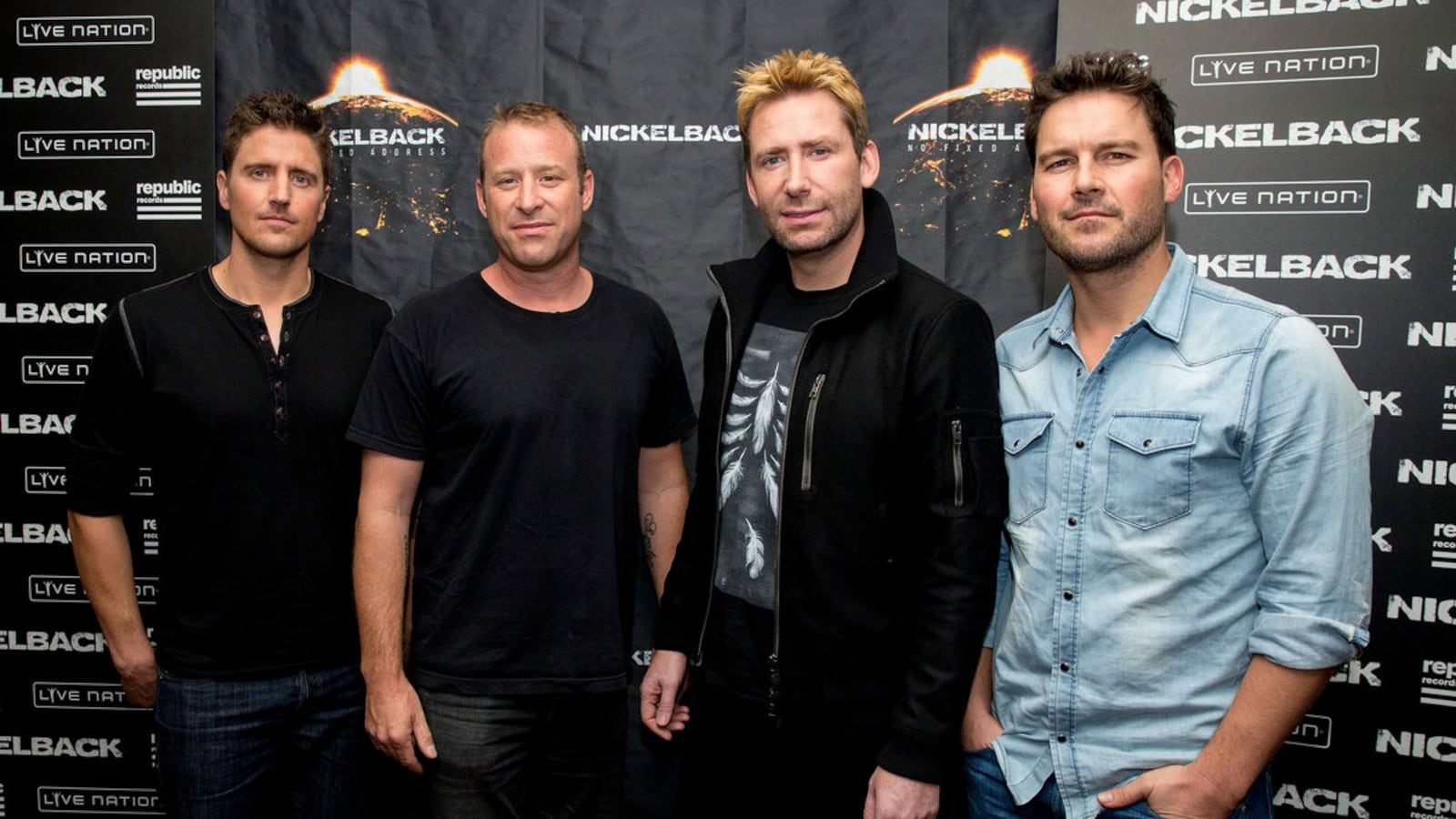The members of Canada’s chart-topping, arena-filling Nickelback—Chad Kroeger (vocals, guitar), his brother Mike Kroeger (bass), Ryan Peake (guitar) and Daniel Adair (drums)—come across as nice, thoughtful guys in Hate to Love: Nickelback. Nonetheless, Leigh Brooks’ documentary knows that they’re also arguably the most reviled foursome in rock ’n’ roll, and it isn’t afraid to address that state of affairs. Unfortunately, as an authorized project primarily designed to celebrate rather than investigate, that hatred goes largely unexamined in this non-fiction affair, which is content to concede that Nickelback rubs millions upon millions the wrong way and then brushes it off in order to lionize them and their crowd-pleasing career.
Given the band’s status as Canada’s favorite modern guitar-rock sons, it’s fitting that Hate to Love: Nickelback is debuting at this year’s Toronto International Film Festival. And considering Kroeger and company’s participation in this big-screen profile, it’s unsurprising that it takes it easy on the quartet, who’ve been fodder for ridicule for almost as long as they’ve been industry juggernauts—a status they first established back in 2002 courtesy of Silver Side Up’s ubiquitous single, “How You Remind Me.” That’s understandable, and yet it does much to render Brooks’ portrait skin-deep, since what’s most interesting about the act isn’t that they’re loyal lifelong friends and admirably hard-working professionals, but that they’ve inspired an antipathy from segments of the population that defies the pat answers provided here.
The subject of endless viral memes and pop culture punchlines, Nickelback—compared to contemporaries in any artistic field—arouse an unparalleled degree of scorn. Hate to Love: Nickelback has Chad, Ryan, Mike and Daniel discuss that reputation, with Ryan acknowledging, “Nobody picks up a guitar to be in the most hated band in the world.” Yet the reason for that level of negativity is merely chalked up to Nickelback’s popularity (i.e., jealousy), catchiness, and habit of penning dim-bulb party songs and crass strip-club anthems like Dark Horse’s “Something in Your Mouth,” whose chorus’ lyrics go, “You’re so much cooler, When you never pull it out, Cause you look so much cuter, With something in your mouth.” These are all valid causes to dislike the group, if not persuasive explanations for their situation—after all, one could have once said the same things about, say, Motley Crüe, and they never suffered the sorts of slings and arrows that are hurled in Nickelback’s direction.
There appear to be deeper forces at play when it comes to the Nickelback backlash, whether it’s the band’s appropriation of hard rock sounds and elements (such as Slayer, Pantera and Ramones T-shirts) for hooky pop tunes, their performative corniness, or their mainstream appeal, which strikes many—be they niche genre fans or high-minded intellectuals—as immediate, definitive proof of their lameness. Nickelback may not be complex songwriters but they are talented and strike a powerful chord with audiences, and the hostility they’ve engendered therefore comes across as more complicated than Hate to Love: Nickelback cares to admit, much less scrutinize. The film plays into its most intriguing angle (even hinted at by its title), only to focus its attention on recounting the band’s rags-to-riches story, told through archival material, concert and music-video clips, and chats with Chad, Mike, Ryan and Daniel (as well as relatives, friends and colleagues) that prove as shallow as the rest of the proceedings.
Formed in the small Alberta town of Hanna, Nickelback began as a cover band featuring Chad and Ryan on guitar and Mike on bass. Their transition to a four-piece with Chad assuming front-and-center duties soon followed, as did an EP and two initial albums (including their first on heavy metal label Roadrunner Records) that didn’t sell. That all changed when Silver Side Up catapulted them to superstardom, thereby fulfilling the dreams they’d had since they first met as kids. Following the success of The Long Road LP and countless tours, they replaced original drummer Ryan Vikedal with Daniel Adair (from Three Doors Down) and continued their ascent courtesy of additional hit singles (“Rockstar,” “Photograph”) that earned them both male and female fans. Health crises for Mike and Daniel threatened to bring the good times to a premature end, but then didn’t—although how they were overcome is, like many threads in Hate to Love: Nickelback, left unexplained.
On multiple occasions, Mike and his wife Angela refer to Chad’s wild-man predilections (thus necessitating separate tour buses), and the frontman jokes about his youthful run-ins with the law. Hate to Love: Nickelback, however, never elaborates on those issues or the tensions between Mike and Chad seemingly lurking beneath the surface, nor on the band’s songwriting process, most of which apparently begins and ends with workaholic Chad. Despite more than one person stating that, as face of the band, Chad’s identity is inextricably tied to Nickelback, Chad himself is unperturbed by this paradigm, and he’s similarly now at peace with naysayers’ vitriol (“It used to be really bad… some of it, it hurts”). No matter the difficulties they’ve faced or the doubts that have plagued them, the director puts a comfortingly happy face on things. As far as music documentaries go, Metallica: Some Kind of Monster this is not.
The thorniest that Hate to Love: Nickelback gets is when Mike confesses, “I think sometimes people want to hear vacuous dumb shit.” Still, Brooks isn’t interested in critically appraising the band’s catalog, or even having others weigh in on the pros and cons of their output and legacy. Instead, copping to the haters and then pushing back against them is the order of the day, epitomized by both their 2023 induction into the Canadian Music Hall of Fame (whose ceremony boasted a video from Ryan Reynolds proclaiming, “It’s time to accept what we already know: Nickelback is fucking amazing”) as well as a Once Upon a Deadpool scene in which the actor’s superhero defends the group’s honor and touts its accomplishments to Fred Savage, who deems them “overproduced, formulaic ear garbage.”
As with Mike’s brief talk about mortality (a topic he was forced to confront after a stroke at the age of 40), Hate to Love: Nickelback repeatedly flirts with seriousness before retreating to safer ground. Consequently, it is—disappointingly if aptly—a proudly middle-of-the-road affair.
Liked this review? Sign up to get our weekly See Skip newsletter every Tuesday and find out what new shows and movies are worth watching, and which aren’t.





